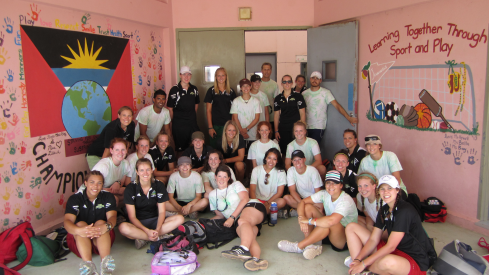By Karen Aney (The Cascade) – Email
Date Posted: September 1, 2011
Print Edition: August 25, 2011

UFV’s Champions for Health program – a successful venture in which UFV Kinesiology students visit Antigua and Barbuda to teach physical education and life skills to local children – is now heading into its fourth year at our university with an unprecedented angle: inviting Antiguan teachers to visit Abbotsford as well. The program, which has run for six years total – three being outside of the University – has been headed at UFV by kinesiology professor Joanna Sheppard; it offers participants the advantage of a hands-on educational experience that can only be found in a real-life learning environment.
While lessons center around sports and games, the subjects that participants teach delve further into the realm of social accountability. For instance, the teachers don’t simply play frisbee with their students; they play a game called ‘Can’t Touch Disc,’ and use the game to teach their students about communication. The first portion of the lesson is taught merely through the physical activity of the game. Afterward, the teachers conduct a “connect and reflect” session where the students tell them what they’ve learned.
In a blog posting, student teacher Carly Wright explained: “At the end of the lesson during our reflection we tied in communication to the class. We focused on the four tools of communication; talking, listening, eye contact and body language. From there, the students told us why communication is important in the classroom and on the playground. The children proceeded to explain to us where else communication is important in life and why.” Through methods like these, the student teachers achieve two outcomes: firstly, they pass on a love for and understanding of physical education. Secondly, they pass on an understanding of the importance that components of physical education play in the day-to-day lives of people both in Canada and Antigua.
For the first time in the program’s history, teachers from the Antiguan schools will be returning to UFV to do an exchange: the university will be welcoming as many as four Antiguan physical education or generalist instructors to stay here for the entire month of January. During that time, participants will audit different Kinesiology courses at UFV. This collaboration between the KPE instructors and the Antiguan teachers will hopefully continue the dissemination of best practices in physical education, serving as a learning experience for both members of our campus society and the visiting teachers.
In addition to the time spent here on campus, guest teachers will be volunteering within the Abbotsford school district. There, they will act as assistant teachers and provide fresh takes on physical activity and education. Sheppard explained: “It will be a best practices collaboration, which is what our program concentrates on [in Antigua]…it involves teachers coming together for the educational benefits of the children.” This student-centered teaching style is echoed by the UFV students’ approach in Antigua, where they teach classes alongside the classroom’s teachers and discuss learning outcomes and benefits.
The teaching experience gained through the program is invaluable. Sheppard reported that most of the student applicants want to find a career in a teaching or leadership capacity, and “to learn to teach within a different educational framework is valuable in many situations…many graduates of the program go on internationally.” A benefit of this international program in particular is that it’s not just athletics, and it’s not just outreach – it’s real teaching experience that benefits the lives of students and teachers, with pervasive enough lessons that it has a positive effect on the community as well.
A fresh new aspect of the program’s most recent incarnation has been the research project conducted by fourth-year student Celine Charbonneau. Her project has involved taking prescribed learning outcomes being used in Canadian schools and applying them in the Antiguan classroom using physical education. Teaching about things such as communicable diseases is relegated to a classroom setting in Canada; Charbonneau’s study sought to see if utilizing physical education results in a deeper level of comprehension in students.
Another facet of the program that changed this year was the participation of UFV Women’s Basketball. The group spent their time running day camps and after-school camps, in addition to competing with local Antiguan teams. Head coach Al Tuchscherer said that this has provided a great opportunity for team bonding through outreach – the program kicked off their off-season training, and set a precedent within the team for being involved in the community in a positive way.
One thing to note is that the students involved predominantly pay their own way. Grants are generously provided by the Student Union Society and a few other sources, but this program is still very much in need of donations. Gently used sporting equipment would be welcome, and can be brought to the T Building or to donation boxes set throughout campus starting September 15.
Applications are being accepted until October 15 for the 2012 trip to Antigua. Visit their website for more information. Contact Joanna Sheppard, Champion’s for Health program director, through e-mail if you have any questions.


